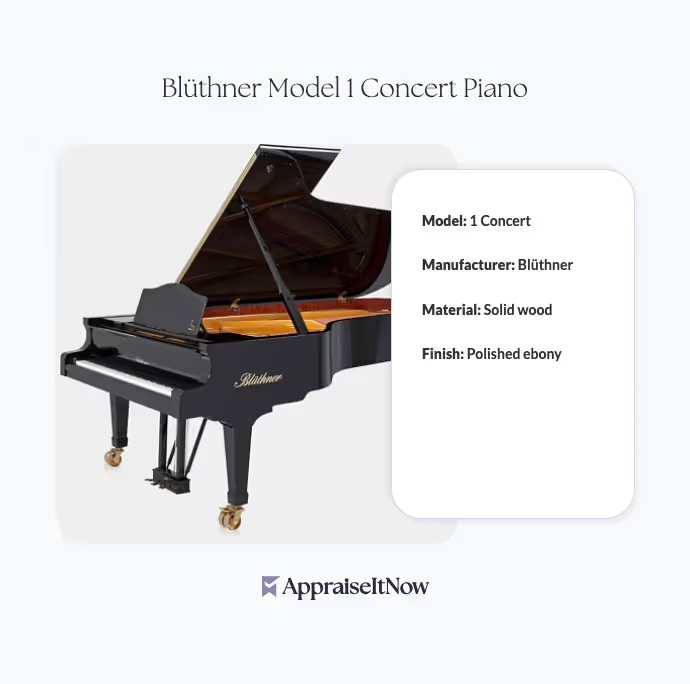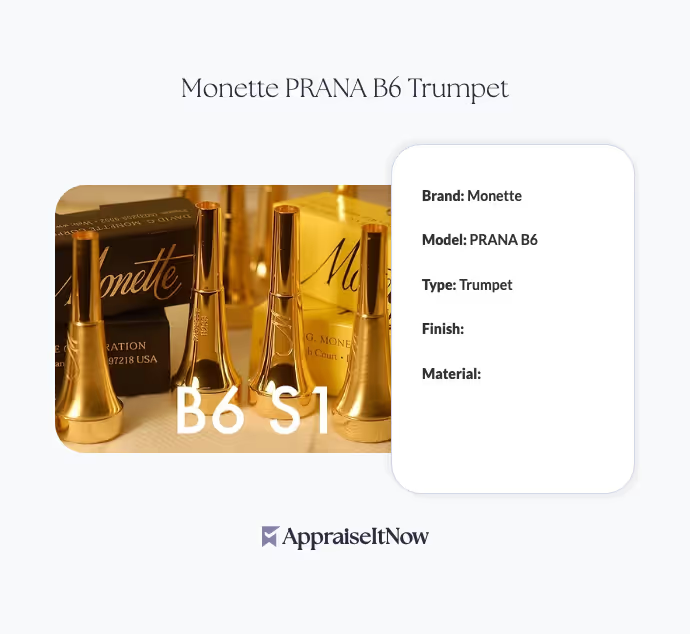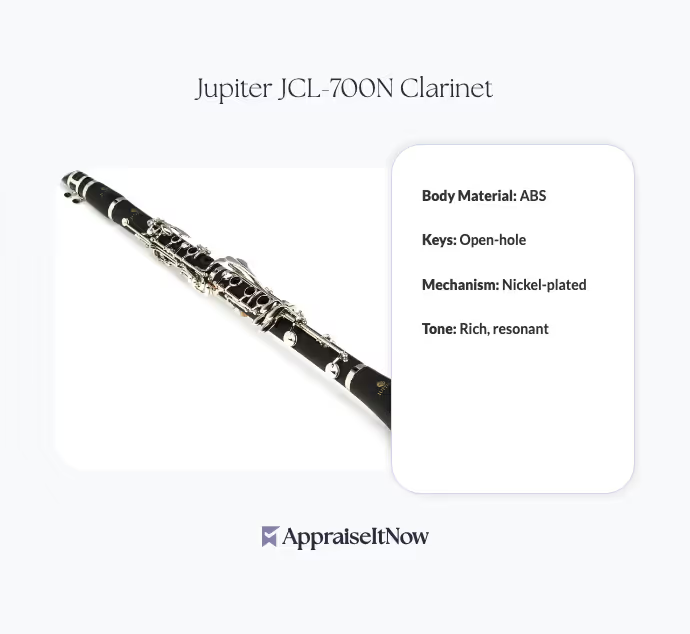<h1>How to Get Your Blüthner Model 1 Concert Piano Appraised</h1>
<p>The Blüthner Model 1 Concert Piano represents one of the finest achievements in German piano-making, commanding market values between <strong>$20,000 and $30,000</strong> for well-maintained examples. Whether you're considering selling, insuring, or evaluating an inherited instrument, understanding how to obtain a professional appraisal ensures you capture the true value of this masterpiece.</p>
<h2>Understanding Blüthner Model 1 Concert Piano Value</h2>
<p>Your Blüthner Model 1 isn't simply a musical instrument—it's a significant asset with historical importance and considerable financial worth. First introduced in 1860, this concert grand piano has earned its reputation among classical musicians and collectors worldwide for its exceptional build quality and warm, resonant tone. The Model 1's presence in concert halls and premier recording studios across the globe speaks to its standing as a genuine masterpiece of engineering and craftsmanship.</p>
<p>The piano's 88 keys, German construction, and spruce soundboard represent the technical foundation of its value. But what truly drives pricing is the combination of mechanical integrity, tonal characteristics, and market demand among serious pianists and collectors. When appraising a Blüthner Model 1, professional evaluators consider each of these factors in concert to establish fair market value.</p>
<div class="callout tip"><p><strong>Market Insight</strong></p>
<p>Blüthner pianos maintain strong collector interest internationally, particularly among concert professionals and serious musicians seeking instruments with documented performance history.</p></div>
<h2>Why Blüthner Pianos Stand Apart</h2>
<p>Are Blüthner pianos any good? The answer is definitively yes—and the market reflects this. Blüthner has maintained production standards since 1853, creating instruments known for their durability and tonal warmth. The Model 1 specifically represents the brand's commitment to concert-level performance, distinguishing it from student or entry-level pianos that trade at dramatically lower values.</p>
<p>Is Blüthner better than Steinway? This question appears frequently among piano enthusiasts, but the answer depends on personal preference and specific use cases. Blüthner pianos are renowned for their singing quality and responsiveness, while Steinway instruments emphasize projection and power. Both command premium prices in the collectible <a href="/blog/appraising-musical-instruments-determining-the-worth-of-melodic-investments">musical instruments</a> market, with selection often coming down to tonal preference rather than objective superiority. Professional appraisers evaluate your specific Blüthner Model 1 against comparable sales to establish its individual market position.</p>
<h2>Key Factors Affecting Your Blüthner Model 1's Appraisal Value</h2>
<h3>Age and Production Year</h3>
<p>The Blüthner Model 1 Concert Piano's age significantly influences its appraisal. Instruments produced during specific eras—particularly those from the late 19th and early 20th centuries—often command premium valuations among collectors who prize historical significance alongside performance capabilities. However, newer Blüthner pianos still maintain strong values if they've been professionally maintained and show minimal wear.</p>
<p>Are 50 year old pianos worth anything? Absolutely. A 50-year-old Blüthner Model 1 typically retains substantial value, often ranging within the mid-to-upper spectrum of the $20,000-$30,000 range, provided it's been properly cared for. Is a 100 year old piano still good? German-manufactured Blüthner instruments from a century ago frequently outperform many modern pianos in terms of tonal quality and structural integrity, making them increasingly valuable as historical pieces.</p>
<h3>Condition and Mechanical Integrity</h3>
<p>Professional appraisers conduct thorough evaluations of your piano's mechanical systems. They examine the action mechanism—the complex system of hammers, dampers, and levers that respond to your touch—to assess responsiveness and regulation. The soundboard's condition proves particularly critical, as even hairline cracks can affect tonal quality and structural stability.</p>
<p>Cosmetic condition matters too. Original finish, veneer integrity, and the condition of the sustain pedal all factor into the appraisal. A piano with original hardware and minimal refinishing typically commands higher valuations than one requiring restoration work.</p>
<h3>Performance History and Documentation</h3>
<p>Does your Blüthner Model 1 have documented performance history? Professional performances, recordings, or appearances in noteworthy venues add substantial premiums to the appraisal value. Documentation proving the piano was used in concert settings, recording studios, or by recognized musicians strengthens both its market positioning and collectibility. When seeking a professional appraisal, gather any available performance records, concert programs, or historical documentation.</p>
<h2>The Professional Appraisal Process</h2>
<p>Obtaining an accurate appraisal requires working with experts who understand both piano mechanics and market dynamics. AppraiseItNow connects you with credentialed appraisers specializing in <a href="/types/personal-property">personal property</a> and musical instruments who provide USPAP-compliant valuations suitable for insurance, sale, estate planning, or donation purposes.</p>
<p>The appraisal process typically begins with comprehensive photography and documentation of your instrument's condition. Appraisers examine the action mechanism, soundboard integrity, case condition, and all hardware components. They assess tonal qualities and mechanical responsiveness—areas where a professional's expertise becomes invaluable in establishing accurate market value. The appraiser then researches comparable sales data, considering factors like instrument age, condition, and market demand to establish your Blüthner Model 1's specific valuation.</p>
<div class="callout note"><p><strong>Appraisal Advantage</strong></p>
<p>Professional appraisals provide documentation accepted by insurance companies, courts, and financial institutions, protecting your interests whether buying, selling, or managing the asset.</p></div>
<h2>Market Demand and Collector Interest</h2>
<p>Who plays Blüthner pianos? Accomplished concert pianists, serious music students, and dedicated collectors represent your piano's primary market. Blüthner pianos appear consistently in professional performances across Europe and increasingly in North America, maintaining steady demand among musicians seeking superior tonal qualities. This collector base supports the consistent valuation range of $20,000-$30,000 for Model 1 examples in good condition.</p>
<p>Are Blüthner pianos still made? Yes—the company continues manufacturing in Germany, maintaining the same commitment to quality that established its reputation. However, older Blüthner instruments often command premiums among collectors who value vintage craftsmanship and the tonal characteristics that develop over decades of professional use. Understanding current market demand helps position your specific piano appropriately for sale or valuation purposes.</p>
<h2>Storage, Maintenance, and Value Preservation</h2>
<p>Protecting your Blüthner Model 1's value requires appropriate care. Pianos are sensitive to environmental conditions—fluctuating temperature and humidity directly impact soundboard integrity and mechanical performance. Maintain your instrument in climate-controlled spaces between 65-75°F with 45-55% humidity to prevent warping, cracking, or mechanical degradation.</p>
<p>Regular professional maintenance preserves both function and value. Annual technician inspections, action regulation, and voicing services prevent deterioration and ensure your piano maintains its performance qualities. Documenting all maintenance work strengthens your appraisal documentation and demonstrates responsible stewardship to potential buyers or appraisers. This attention to preservation parallels how collectors approach <a href="/blog/the-benefits-of-professional-appraisals-for-antique-artwork">antique artwork</a> and other fine property—careful preservation directly impacts financial value.</p>
<h2>When to Seek an Appraisal</h2>
<p>You should obtain a professional Blüthner Model 1 appraisal when planning to sell, establishing insurance coverage, managing an estate, making charitable donations, or navigating divorce settlements. If you're considering purchase, a pre-acquisition appraisal protects your investment by verifying condition, authenticity, and fair market value. For those wondering about the financial implications of musical instrument ownership, professional valuations clarify whether an instrument represents a stable asset or requires investment in restoration.</p>
<div class="callout tip"><p><strong>Planning Ahead</strong></p>
<p>Updating your appraisal every 3-5 years ensures your insurance coverage and financial planning remain aligned with current market values, protecting this significant asset against unforeseen circumstances.</p></div>
<h2>Beyond Basic Appraisal: Comprehensive Asset Documentation</h2>
<p>Professional appraisals for <a href="/types/equipment-and-machinery">equipment and machinery</a> like fine pianos often extend beyond simple valuation. Certified appraisers provide detailed condition assessments, photographic documentation, and market analysis that support your decision-making whether buying, selling, insuring, or planning estates. This comprehensive documentation proves invaluable for <a href="/types/memorabilia-and-collectibles">memorabilia and collectibles</a> management, ensuring you understand both the historical significance and monetary value of your Blüthner Model 1.</p>
<div class="callout note"><p><strong>Key Takeaway</strong></p>
<p>A certified appraisal of your Blüthner Model 1 Concert Piano provides essential documentation for insurance, sale, estate planning, or investment purposes, ensuring you understand and protect the true value of this German-made masterpiece. With current market valuations between $20,000 and $30,000, professional expertise transforms uncertainty into confidence.</p></div>
















